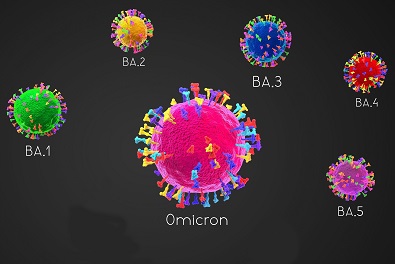Study Uncovers Sinister Secrets of Omicron Variant: Not All Sub-Lineages Are Created Equal In Their Attack On The Human Lungs!
COVID-19 News - Different Omicron Sub-Lineages Modulate Interferon Differently May 24, 2023 2 years, 9 months, 1 week, 23 hours, 53 minutes ago
COVID-19 News: A groundbreaking study conducted by the University of Siena-Italy and Santa Maria delle Scotte Hospital-Italy has sent shockwaves through the scientific community and raised alarming concerns about the highly contagious Omicron variant of the SARS-CoV-2 virus and its sub-lineages including its recombinant variants.

The study's findings reveal that different sub-lineages of the Omicron variant, known as BA.1, BA.2, and BA.5, possess distinct abilities to modulate the human immune system response, particularly interfering with the vital interferon response in human lung epithelial cells.
While much attention has been focused on the Spike protein mutations of the Omicron variant, this new research highlights the critical role played by mutations outside the Spike region, which significantly contribute to the virus's pathogenesis, adaptation, and immune system evasion.
The study identified mutations in antagonistic viral proteins to interferon-beta (IFN-β), a crucial component of the innate immune system.
Notably, the BA.2 sub-lineage stood out by exhibiting no downregulation of IFN-β secretion in laboratory tests, which could have significant implications for the variant's ability to spread and cause severe illness.
The study team delved further into the underlying mechanisms behind this discrepancy and discovered a specific mutation in the ORF6 protein (D61L) present in BA.2. This mutation appears to be associated with the viral protein's antagonistic function, effectively hindering its ability to inhibit IFN-β production.
Intriguingly, the study also suggests the involvement of post-transcriptional events in the Omicron variant's escape from innate immunity, specifically in the BA.1 sub-lineage.
Since its emergence in November 2021, the Omicron variant has rapidly spread worldwide, posing a formidable threat to public health and the global economy. With over 60 mutations in its genome, particularly within the Spike protein, the Omicron variant has proven to be highly infectious, surpassing the previous Delta variant's transmission rate as covered in numerous studies and past
COVID-19 News reports.
However, the study's findings shed light on an unexpected aspect of the Omicron variant i.e. despite its heightened transmissibility, infected individuals often exhibit milder symptoms, with fewer cases of pneumonia reported. This phenomenon may be attributed to the variant's reduced replication in human lung cells and its induction of fewer inflammatory cytokines.
The phylogenetic analysis of the Omicron variant further reveals the existence of distinct sub-lineages, including BA.1, BA.2, BA.3, BA.4, and BA.5. While BA.5 and other sub-variants continue to be monitored, the study's focus on BA.2 and its unique ability to evade the immune system has raised alarming concerns.
The study's findings have profound implications for our understanding of the Omicron variant, its sub-lineages and the newer recombinant variants like XBB variant
and its sub-lineages and their potential impact on public health.
By shedding light on the intricate ways in which different sub-lineages modulate the immune system, this research emphasizes the urgent need for comprehensive strategies to combat the ongoing pandemic. As scientists and healthcare professionals work tirelessly to develop effective treatments and vaccines, this study serves as a wake-up call, highlighting the intricate and evolving nature of the SARS-CoV-2 virus. The battle against COVID-19 is far from over, and the Omicron variant continues to surprise researchers with its ability to outsmart the human immune system.
The study findings were published in the peer reviewed journal: Virus Research (Science Direct).
https://www.sciencedirect.com/science/article/pii/S0168170223000965
For the latest
COVID-19 News, keep on logging to Thailand Medical News.
